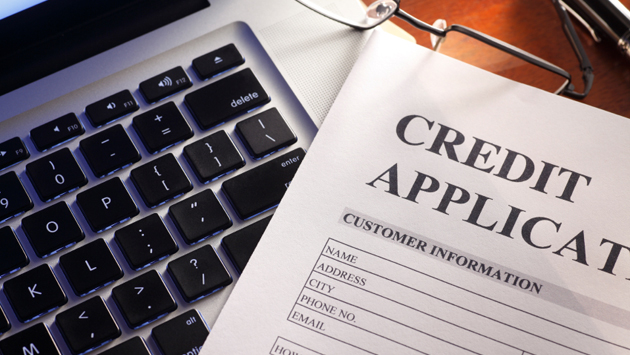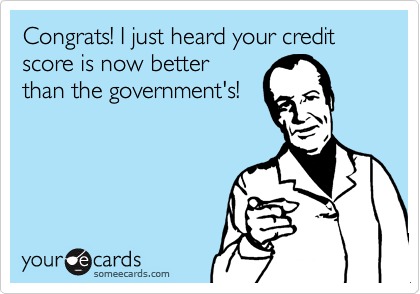Being in your 20s can be a weird in-between time. While you’re technically an adult and can do things like vote and buy porn, you have no clue what it means to be a real person. There are so many things that go into it and knowing where to begin can be as overwhelming as the prospect of figuring everything out.
But don’t worry. We’re not going to let you be thrust into the real world as a semi-real person without some sort of lifejacket to get you to shore.
What it is
We’ve all seen the freecreditreport.com ads. They used to have super catchy jingles about dressing like pirates in restaurants or living in the basement at your dream girl’s parents’ house. And sure the commercials are great, but if you’re anything like me, you didn’t really give the content of these ads a second thought.

Via: New York Times
But then adulthood happens, and you realize that your credit score is actually pretty damn important for everything from loans to credit card applications to buying your first car.
When you get into a situation where you have to know your credit score, you need to be able to read it properly and fully understand what credit scores are actually scoring.
So what exactly is it? A credit score is a three-digit number that helps lenders determine whether or not you’re worthy of getting a loan, mortgage or line of credit with them. The score tells them whether you are financially responsible.
The three-digit score is determined by a lot of different factors that are all funneled through the Fair Isaac Corporation. They analyze all of your data and produce a FICO score, which is a number ranging from 300 to 850. A good score is, on average, 720, but different lenders have different standards, so it may actually be lower or higher than that depending on the lender.

Via: Toll Talks
Here’s how your score is determined:
- 35 percent of your score is determined by your payment history. This is the largest chunk of how your score is figured out. Basically, it’s about how well you pay your debts. Do you pay on time? Do you pay in full or just the minimum? Everything you owe is in this portion. Student loans, outstanding credit card debt, parking tickets (yes, even the ones from UFPD) and even library fines can all affect this portion of your score. So make sure to pay on time and in-full if you can.
- 30 percent of your score is based on how much you owe each of your creditors and how that compares to the amount of credit you’ve been allotted. If you’re maxing out all your credit, your score is going to suffer.
- 15 percent of your score is based on how long your credit history has been active. You want to have fewer accounts for longer as long as you’ve made your payments on time. This shows that you are a good investment because you have a history of being able to keep up with your credit.
- The next 10 percent has to do with how many accounts have been opened and how many inquiries have been made about your credit recently compared to how many accounts you have in total. Opening a lot of new accounts for credit or trying to open a lot of new accounts for credit can be indicative of being in financial trouble, which means your score is going to drop. It’s all about perception in the credit score game, and you don’t want to come off looking like you don’t know how to manage your money.
- And the last 10 percent of your score is determined by the kinds of credit that is used. If you have a student loan payment that is a fixed monthly payment that you are able to pay each month, it shows that you are able to handle a large loan. That is good, but lenders are more interested in how you handle variable payments like credit card bills because these tend to be more useful in predicting future behavior.
Your credit score is pretty simple actually. Fair Isaac uses behavior to gauge whether or not you are financially responsible. But what if you don’t have any credit open? How can you be considered?

Via: Life’d
On April 1, the Wall Street Journal posted an article detailing new criteria for an unnamed new credit scoring system that will be implemented by FICO probably within the next year.
This new system will now be able to score about 53 million people who right now don’t have scores or credit reports. It is because they are looking to expand the basis of payment history (which is 35 percent of your score if you remember) to include things like cable, cellphone and utility bills that are right now not included.
Not much is known about the new system as of right now, but more details will be released as they figure out what they’re doing. The bottom line is, like with all other forms of bills you owe, it is important that you pay them in a timely manner in order to avoid future problems with your credit score.
Why it’s important
Your score is important to determining whether or not you’re a worthy risk for many lenders, so things like buying a car or getting a loan or eventually getting a mortgage is determined by your score.
You may have credit open now, but that doesn’t mean that your score is fixed. It can change over time, so don’t worry if your score isn’t where you want it to be now. Just get back on track with paying off your existing lines of credit and your score will improve.
How to go about getting it
With all the ads on television about how to get your free credit score, you’d think that it would be something that you could just Google and find no problem. It’s not. You need to be careful about what sites you use to check your credit score because some are just out to make a profit off people who don’t realize what they’re doing.
So here’s the deal. You can get a free copy of your credit report from each of the three credit agencies Experian, Equifax or TransUnion once a year. If you’re doing your math correctly, that means you can get a free credit report three times per year, which is all you really need anyway.

Via: Some E-Cards
AnnualCreditReport.com is your most reliable method for checking your credit report. It is the only free one authorized by federal law. You can also go directly to one of the three credit reporting agencies in order to find out your report.
However, if you’re looking for just your FICO score with one of the agencies, that is only available for a fee. CreditKarma.com has a partnership with TransUnion and provides you with free credit scores and reports once a year. You can actually trust Credit Karma, as opposed to some of the other third party “free credit score” sites that ask you for your credit card number.
Looking at your free report will give you a good idea of where you stand with your credit, so my advice is don’t even bother with knowing your actual FICO score because it changes. Life’s too short to let yourself be defined by a number anyway.
Feature photo courtesy of: Certified Property Solutions






